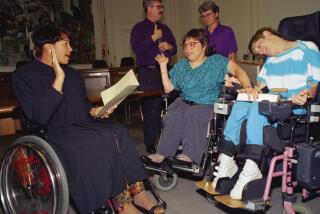Stanley Herr, 56; Fought for Disabled
- Share via
Stanley S. Herr, a University of Maryland law professor who helped establish the federal law requiring appropriate public education for disabled children, died Thursday of adrenal cancer at his home in Baltimore. He was 56.
For nearly two decades Herr taught civil rights, human rights and clinical legal education. He helped write the 1989 Maryland law that prohibits the execution of criminals identified as mentally retarded.
He also submitted a brief that was cited by the Supreme Court in abolishing the death penalty for the mentally retarded.
In the early 1970s, he played a role in cases that freed mental patients from long-term hospitalization in warehouse-like institutions.
An authority on retardation and mental illness, Herr wrote extensively on the subject: five books and 100 articles on disability rights, elder rights, children’s rights and human rights.
“As a lawyer and human being, Stan Herr devoted his life to the pursuit of justice, especially for persons with disabilities,” said R. Sargent Shriver, the Peace Corps founder and former vice presidential candidate who was a longtime friend.
Herr’s career began in 1970 as a children’s rights and public interest lawyer.
Legal colleagues said that within two years he was instrumental in changing the landscape of disability rights law. The vehicle was the 1972 landmark case of Mills vs. District of Columbia that established “the constitutional right to a free and appropriate public education for children with all types and severities of disabilities.”
In the Mills case, Herr discovered a child named Gregory who was excluded from school for months because he threw spitballs at other students.
He was incorrectly diagnosed with mental retardation and pervasive multiple handicaps affecting basic life skills and learning. Congress and the Supreme Court cited Mills as providing the legal and political road map for the 1975 National Education for All Handicapped Children Act that required special education for every child with disabilities.
Herr also played a significant role in the 1972 Willowbrook cases--named for a New York mental institution--which led to the closing of warehouse-type institutions and the expansion of community-based services for people with mental disabilities. A second court decision recognized the constitutional right to mental health treatment and housing.
Herr was also an advocate for giving Baltimore’s public school students effective instruction in basic reading skills: “If you don’t get proper reading instruction in the early grades, you get low self-esteem and you get emotional problems and you get an aversion to going to school and it’s all downhill from there,” he told The Sun in a 1998 interview.
Born in Newark, N.J., he was a 1967 graduate of Yale College, where he sang in the Russian Chorus and Glee Club. He took a law degree from Yale Law School in 1970 and earned a doctorate in philosophy from Oxford University in England in 1979. He joined the Maryland faculty as a full professor in 1983.
He was a Kennedy Public Policy Fellow at the White House from 1993 to 1995, and had earlier been a Rockefeller Fellow for Human Rights at Columbia University and a Kennedy Fellow at Balliol College, Oxford University.
He also taught at the Harvard and Catholic University law schools.
He is survived by his wife of 22 years, the former Raquel Schuster; three school-age children, son David Louis, and twin daughters Deborah Ann and Ilana Deborah; and a sister, Judith N. Herr of Bethesda, Md.
More to Read
Sign up for Essential California
The most important California stories and recommendations in your inbox every morning.
You may occasionally receive promotional content from the Los Angeles Times.













